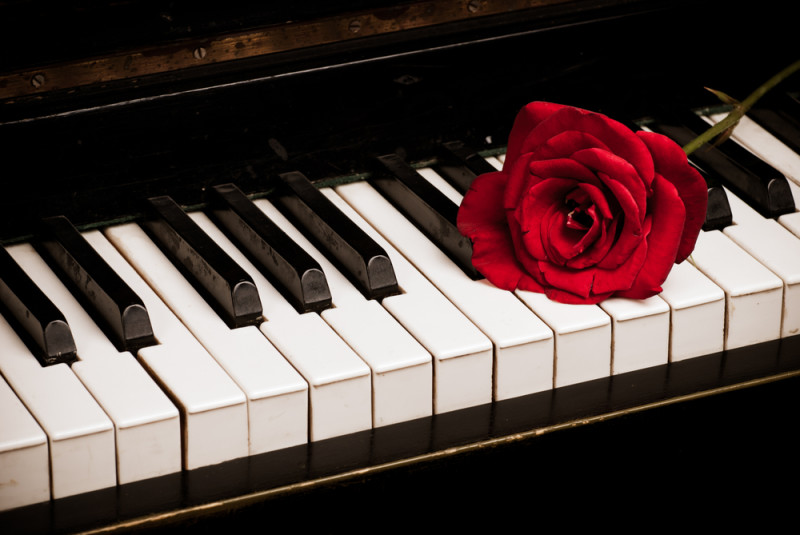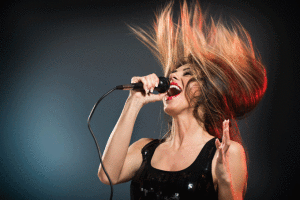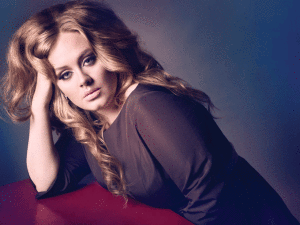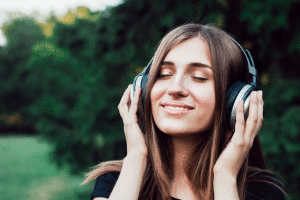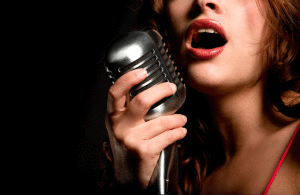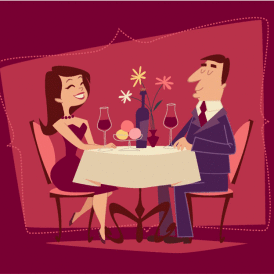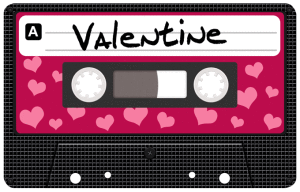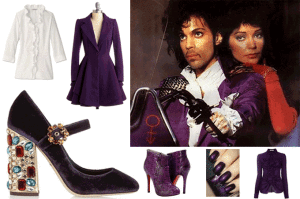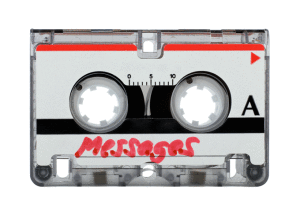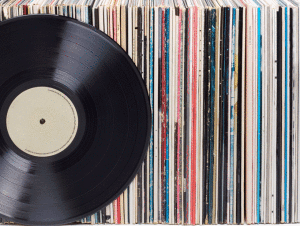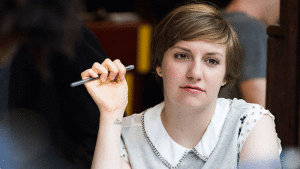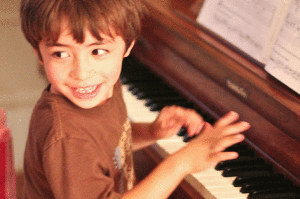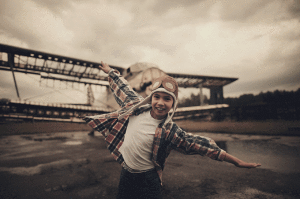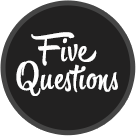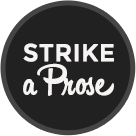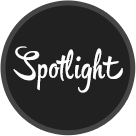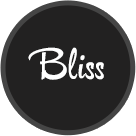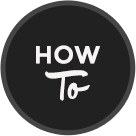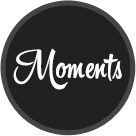Ladies, I have news. I have fallen helplessly in love. The object of my affection is a 26-year old with great legs, who is sometimes low-key and occasionally high strung. During the past three months I’ve wanted to be at his side constantly, and he’s happily obliged. No, I haven’t fallen in love with an Ashton Kutcher lookalike, but rather with the used Baldwin upright that’s been sitting in my living room since August. I’m smitten.
I actually fell for this piano decades ago, before I even had it in my possession. Since I was a little girl, I had wanted to play. I asked my parents for lessons, but they couldn’t afford them, and they certainly couldn’t come up with the cash for a piano. Then, as the years went by, I swore I would learn on my own, but somehow it never happened. I blamed the lack of time. The lack of money. The fact that, no matter how hard I practiced, it was just too late to get to Carnegie Hall. So I lived my musical life inside my head, because, well, it was just easier that way.
Funny thing happens when you become a parent. You give your kids opportunities you never had, and then you realize, with a mixture of excitement and regret, that it could’ve been you. I watched my daughter and my son sit down at the piano right after they each turned 5. They began with weekly classes at school, and now they sightread music and even make up their own tunes. They look forward to their lessons, even when they find a particular song challenging. It helps that the progressive school they attend emphasizes that the fun is in the process and that failure builds character—a message I certainly didn’t learn from a father, God bless him, who would yell at me while teaching me how to ride a bicycle. Now, watching my kids learn something, with such ease and joy, that seemed out of my reach for decades, I feel at once sad, because I lost so many years to inertia, and elated, because quite frankly, if these offspring of mine can do it, why can’t I?
Realizing it was now or never, I asked my children’s teacher if he would come to our house and give all three of us lessons. At first it was frustrating, embarking on this journey of learning to play piano as an adult. Practice time was hard to come by. I hated the fact that I’d have to start my repertoire with Yankee Doodle, rather than Duke Ellington. Then there was the matter of my brain not being able to keep up with my desire to play. As I sat down for my first lesson, just remembering where the A key was in relation to Middle C was a challenge. But as I began to exercise my noggin in a completely different way, I could almost hear the neurons in my brain fusing together to make exciting new connections.
Next to the possible Alzheimer’s-prevention benefit, the best thing about playing piano is that I’m finally learning the exciting language of music, which has always seemed so elusive. That’s what treble clef is! That’s what musicians mean when they refer to “going up an octave”! That’s what those mysterious foot pedals are for! Since August, I have been the proverbial kid in the candy store—only, the glass jars in my black-and-white sweet shop are filled not with M&Ms and licorice, but with bass clefs, half notes, and arpeggiated chord notations.
And I’m moving faster than I would’ve ever imagined. The book series we’re using, Nancy and Randall Faber’s Accelerated Piano Adventures for the Older Beginner, has adult students learning so much at once—sight reading, the major chords, how to move both hands around the keyboard—and playing some decent music, including Mozart and ragtime. The idea behind the program is that if you incorporate all the crucial elements from the beginning, it may seem tricky at first, but eventually everything comes together more quickly and organically.
The other day my son was perusing my lesson book and asked me why I was already learning songs that he, who has been studying piano for two years, wasn’t yet ready for. My daughter interjected: “Because mom is going to die before we are. She’s got to learn faster.”
I couldn’t argue with that logic, especially because it took me four decades to get started and I have a lot of catching up to do. There are benefits to learning as a grownup, however. Your richer life experience enables you to see the big picture better than kids can. Noah Adams, whose book Piano Lessons chronicled his year of learning to play piano at age 52, wrote: “A satisfaction, an ease, of beginning to play the piano as an adult is that we already know these songs; we can sing the melodies, and we’ve danced in waltz time.” Now, we’d just like to play those songs on our own, thank you very much.
So I had the desire to learn, the work ethic to do my homework and practice every day, the courage to let my brain take its sweet time absorbing all this new information. The one thing I lacked my teacher picked up on.
“You’re thinking too hard,” he said one day when I was repeatedly missing the same few notes in a piece. “You’re worrying too much about getting it wrong.”
Well, wasn’t that the point, I asked, to hit the right notes? I was surprised when he said no. “It’s more important to get the rhythm right. The best musicians get lost in the rhythm, and just let the notes come to them.”
I was dubious. But then he asked me to play the song faster. And wouldn’t you know, the more quickly I played, the less I thought about the notes and the fewer I missed.
Another thing I realized is that you’ve got to have a sense of humor, and go easy on yourself, when you’re learning something this big. One day, I kept missing the same F note, and, in an act that quickly reminded me that most of his students were in diapers when Arnold Schwarzenegger was inaugurated governor of California, my teacher drew a little speech bubble above it. “This note is saying something,” he said, tapping the quarter note with a pencil and, presumably, bracing himself to fill in the bubble with a phrase like “Play me!” or “I’m an F!” He asked, “Do you know what this note is saying?”
I replied, “Yes, it’s saying ‘This chick really sucks at piano.’ ”
What’s not funny about attempting to become a musician at my age is simply fun, and during one of my lessons I had no idea I was singing aloud until my teacher pointed it out. For once I wasn’t thinking too hard, or staring at the notes on the sheet music, or feeling self-conscious about what my fingers were playing or, apparently, the imperfect sounds that were coming out of my mouth. I was just experiencing pure, unbridled joy that comes with learning something new and connecting with a long-lost passion.
So believe me, whether you’re 16 or 60, it really isn’t too late to chase your dreams. Get out there and learn a new instrument. Hop on a skateboard or surfboard, or give stand-up comedy a shot. Just remember not to think so hard, or worry about how you look or sound to other people. Just follow your intuition, allow yourself to fall in love, and you’ll go where you need to go. Even if it’s miles from Carnegie Hall.
This story originally appeared in Lady and a Red Typewriter, 2012

